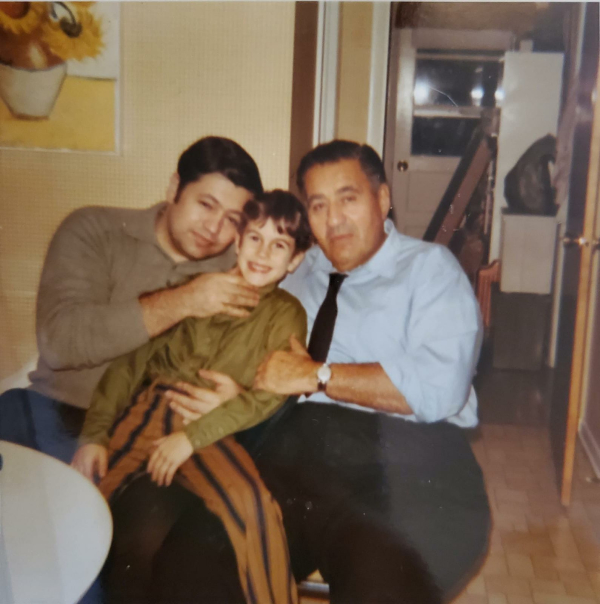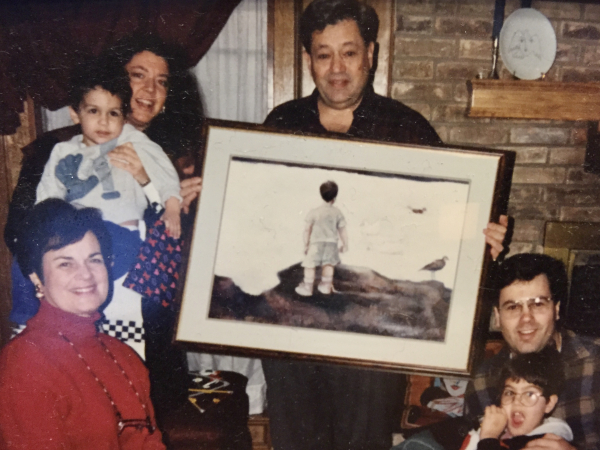Happy Father's Day!
Both of my children are adults now. It's strange to consider them fully-functioning autonomous adults – because I remember their childhood like it was yesterday (like worrying whether the soft spot on their heads would ever fill in and harden up, or if they'd ever stop sleeping with a nightlight).
Today, they're men doing great things, and I get to be proud of them. I also get to be proud of my role in their growth and proud of passing down the wisdom of my dad, and his father, and the rest who came before me.
It has been 20 years since my father died ... Crazy how time flies! He was my best friend and an amazing mentor. His vision for what I could become helped shape and inform my goals, my accomplishments, and yes, me.
For example, after winning the State Championship in the shot put, my dad came down from the stands onto the field. He hugged me and told me that he knew I could do it. Then, he looked deeply into my eyes and asked whether I was a little disappointed? "Disappointed?" I asked. "But, Dad, I won." He looked at me and said, "Winning is great ... but you didn't throw a personal best." He was proud, and he loved me. He recognized that winning was important ... but he wanted to remind me that the other throwers weren't my real competition.
In life, to be and do your best, the competition is really with yourself; and we both knew I could do better.
My Dad believed in setting high standards. He taught me that most people's lives are defined by their minimum standards. Why? Because once those standards get met, it is easy to get distracted and complacent.
One of his favorite sayings was, "The difference between good and great is infinitesimal." This applies to many things. For example, people who are good take advantage of opportunities; people who are great create them.
As time goes on, I recognize how much of my Dad is in me. And, likewise, how much his father was a part of him ... and how parts of all of us have somehow become a part of my children.

Me, my dad, and grandfather
My Impact on My Children
I hope I've imparted many important lessons to my children - but one of the most impactful lessons was teaching them to enjoy reading.
Some parents try to limit the amount of time their kids spend watching TV or playing video games. I tried something different. Instead, my kids earned their games by reading books. And, they also received more books in the process.
Here's how it worked.
When they finished a book, it was their right, and my obligation, to take them to the bookstore for us to pick up the next book together. Likewise, when they finished ten books, it was their right, and my obligation, to take them to the computer store or game store for them to choose any game they wanted.
When they finished a hundred books, they earned a game system.
There came a point when I wanted one of my sons to start reading grown-up books. He was comfortably reading a particular genre (teen fiction) and didn't want to read the kind of books that I thought he was ready to read (and might enjoy more). So, I created a bonus system that counted a specific book (it might have been a Tom Clancy novel) as three books. I didn't force him; I just let the easier path to a reward "whisper" in his ear what to read. Once he finished that, he never went back to teen fiction.
As they started to get into their teenage years, I needed to up the ante a little. So, 500 books meant they got a laptop of their choice. Both boys cashed in and probably felt like they were taking advantage of their dad.
So, Who Got the Better Bargain?

Three generations of Getsons
Fortunately, in child-rearing, everyone can win. My sons love reading to this day - and have learned that they can accomplish anything they set their minds to... one step at a time.
My sons weren't ever forced to stop watching TV, or read a certain type of book, and always had endless things to keep them entertained.
Win-win.
I like to think each generation becomes better (as people and parents) due to the cumulative experience of the generations that came before them.
We stand on the shoulders of giants.
I look forward to seeing how my (eventual) grandchildren turn out, and how little pieces of me and their great-grandfather show up.
Hope you had a great weekend.
Learning From the Renaissance (No, Not That One...)
Jim Simons is a mathematician and cryptographer who realized that the complex math he used to break codes could help explain financial patterns – and he made billions because of it in his notoriously secretive hedge fund firm called Renaissance Technologies.
He is famous not only for the duration of his success and the size of his results ... but also for the way he made his money (with much lower volatility and risk than his peers and competitors).
His flagship - the Medallion fund - has averaged a net return of 39.1% and has been closed to new investors since 1993. Even more impressive is that those results are on top of their 5% management fee and a 44% performance fee.
To put that into perspective, if you had invested $1,000 into the Medallion Fund in 1988 when it launched, your money would have grown to in excess of $23MM at the end of 2019.
His background is impressive. Simons taught at Harvard and MIT and worked with the NSA. Here is a video where he shares some thoughts in a 2015 TED talk interview. It's worth a watch.
via TED
Interesting stuff ... I hope you got something from it.
His success exists at the nexus of vast amounts of data, next-level technological infrastructure, and intellectual property built by various flavors of mathematicians. A good place to be in the coming world, and a reminder that if you don't know what your edge is, you don't have one.
Despite advanced math still being a mystery to many, most rely on it more than ever ... for example, look at what we're seeing with the growth of machine learning and AI.
The Heartbeat of AI is Still Human
Today, the best algorithms are autonomous. They don't rely on inventors to derive novel insights from the ingested datasets. They take whatever data they can get their hands on, process it, and extract decision signals. Some don't even form hypotheses, they simply look for correlations - the data is an abstraction to be solved in the purest sense.
You don't have to understand why the models do what they do - simply, what it's doing, and that you trust it's construction.
Regardless of how autonomous the systems get, humans are still vital.
Simons built a team of mathematicians whose motivation was doing exciting mathematics and science (rather than hired guns who could be lured away by money).
That doesn't mean money wasn't a motivator, but it hits on something important.
The heart of good math and good AI will always benefit from the quality of the humans around it. You still have to champion integrity, culture, and purpose.
Better Math as a Competitive Advantage
If you've been to our office, or heard me speak, you know how important I believe those ideas are to continuing prosperity.
Constant innovation on a massive scope and scale creates more ways to win.
Onwards!
Posted at 05:29 PM in Business, Current Affairs, Market Commentary, Science, Trading, Trading Tools | Permalink | Comments (0)
Reblog (0)